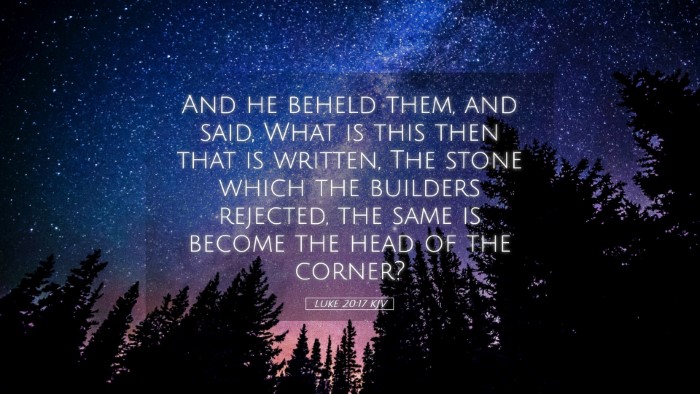Commentary on Luke 20:17
Luke 20:17 states, "But he looked at them and said, 'What then is this that is written: The stone that the builders rejected has become the cornerstone?'" This verse is a crucial piece of scripture that highlights the transformative power of rejection and the fulfillment of prophecy in Christ. The implications of this text reach far into theological realms, calling attention to the nature of God’s kingdom and the identities of Jesus as both rejected and exalted.
Contextual Background
This passage is part of a larger narrative where Jesus is confronted by the religious leaders in Jerusalem. Following the parable of the wicked tenants, Jesus anticipates their inevitable rejection of Him as the cornerstone of God's new covenant. The quotation from Psalm 118:22-23 serves to illustrate a profound irony: while the religious leaders see themselves as builders, they fail to recognize the true foundation of their faith standing before them.
The Significance of the Stone
The "stone" metaphor is multi-faceted in scripture, representing strength, stability, and a foundation upon which believers build their lives and faith. According to Adam Clarke, in his commentary, this “stone” represents Christ, cast aside by the leaders of Israel who fail to acknowledge His authority and divinity. Matthew Henry elaborates on this by stating that the rejection of Christ by those who were supposed to be His followers signifies the tragic misalignment between God’s will and human understanding.
Rejection and Acceptance
Albert Barnes points out that the act of rejecting the cornerstone is emblematic of how God’s chosen people often overlook spiritual truths. The Jewish leaders, who were meant to guide the people to recognize the Messiah, ultimately become the ones who reject Him. This rejection serves not only as a moment of tragedy but as a theological turning point that opens the door for gentiles and a universal church.
Prophetic Fulfillment
The reference to Psalm 118 underscores the prophetic fulfillment that Jesus embodies. Matthew Henry notes that this was a declaration of God’s sovereignty—what was seen as foolishness and weakness by humans (the rejection of Christ) is, in divine wisdom, the very means by which God establishes His kingdom. The cornerstone, once rejected, is elevated to a position of prominence.
Theology of Reversal
The theme of reversal permeates Luke's Gospel: the last shall be first, and the meek shall inherit the earth. The journey from rejection to acceptance is central to understanding the character of God's kingdom. This is echoed by Adam Clarke, who emphasizes that God often chooses the foolish things of the world to confound the wise. Thus, the exaltation of the rejected stone serves to encourage believers—what the world deems unworthy can be a source of life and resurrection.
Applications for the Church
As the church seeks to live out the call of discipleship, Luke 20:17 invites reflection on how rejection manifests in contemporary contexts. Pastors may consider the implications this text has for how congregations respond to marginalized voices within the community. Students and theologians can delve into the paradox of God’s restorative work, focusing on the transformative potential of what seems insignificant or rejected.
Encouragement for the Marginalized
Jesus’ identification as the rejected cornerstone serves as profound encouragement for those feeling marginalized or overlooked. The church is called to remember that worthiness is not determined by human standards but by God’s choosing. This aligns with Henry’s assertion on how believers should endeavor to uplift those who feel like the rejected stones in society, highlighting their significant role in God’s kingdom.
Conclusion
In conclusion, Luke 20:17 encapsulates the essence of the Christian faith—the mystery of rejection leading to acceptance, death leading to resurrection, and the foolish things becoming the foundation of God’s redemptive plan. The verse stands as a potent reminder to past and present generations about the importance of recognizing Christ, the cornerstone, in our lives and in our communities. Each believer is invited to perceive the significance of their faith in light of this truth, building their lives upon the steadfast foundation that has risen from rejection.


